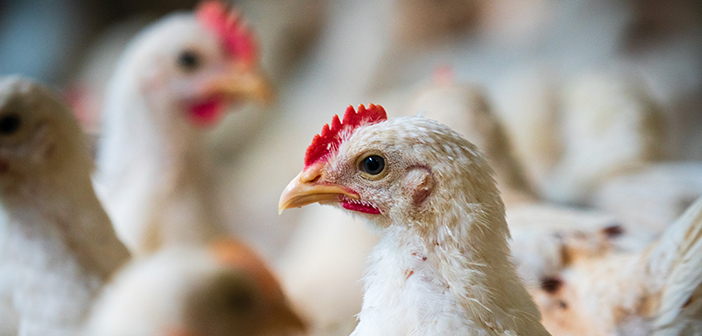By Allan Ball, Slate Hall Veterinary Services
From a health and welfare perspective we would assume that growing birds under lower stocking density should be beneficial. However, there are many other factors which contribute to health and welfare outcomes.
From a profitability perspective, lower stocking densities mean fewer kilograms of liveweight harvested off the floor, meaning more than ever, every bird must count when you consider the proportion of A-grade carcasses produced. This requires optimising health and performance, with a specific focus on disease prevention strategies and optimising intestinal integrity.
If managed optimally, in a lower stocked growing system, we could produce a higher proportion of A-grade carcasses, ultimately seeing little difference in profitability, if the liveweight price is corrected. But it all comes down to good farm management, health and performance, and ensuring the birds’ disease status remains good.
It would be naïve to assume that lower stocking density directly results in a lower risk of disease. The underpinning strategy of disease control remains the same: biosecurity, preventative health measures and surveillance. It’s vital to remain proactive with all disease control strategies, including coccidiosis control, despite the reductions made to the number of birds in the shed. Producers should ensure they continue to review the farm outcome measures, and take feed conversion data, liveability and daily weight gain into consideration.
There is a possibility that lower stocking density growing environments will be more forgiving from a disease challenge viewpoint, as the birds won’t be under the same production and disease pressures they were before. But there is also a greater risk of health challenges being masked, and specifically coccidiosis and intestinal health challenges going undetected through the crop because of reduced growing pressure on the litter conditions.
Over time it could be that disease challenges in sheds reduce if lower stocked growing continues, but coccidiosis challenges will never go away despite routine health prevention programmes. It is vital not to cut corners when it comes to keeping all the basics in place and ensuring they are carried out to the same level as with standard chicken production. I always encourage producers to keep to the strict foundations of hygiene, biosecurity and routine health surveillance, and don’t cut corners on the farm hygiene and turnaround status. Although these measures are primarily targeted towards viral challenge, there will undoubtedly be a negative impact on coccidiosis control if turnaround time is compromised.
If you’re satisfied with the health status and performance of your birds, then it is important to maintain stability in coccidiosis control programmes and maintain the status quo. This will preserve intestinal integrity, supporting flock health and performance, despite the change in stocking density.
Conversely, if you have concerns over the farm performance, and specifically with intestinal instability, feed conversion and growth rate, it’s crucial to address the issue ahead of the winter months when the coccidiosis challenge is more difficult to correct.
Flocks experience peaks and troughs in performance, and when a dip in health and performance is suffered, it can take multiple crops to recover.
There is a common saying that ’good chicken grows good chicken’.
Essentially, birds tend to grow better when the whole farm thrives. By stimulating the growth and replication of favourable bacteria in the birds and their environment, we create a healthy and favourable farm microbiome. This, in turn, populates the unit with beneficial bacteria, fostering a supportive microenvironment for the birds, promoting optimum production and performance.
But with reduced stocking density systems, because the disease pressure with specific reference to intestinal health challenges may reduce, the focus on routine health surveillance and coccidiosis screening may well follow suit. It is critical that, even though the litter conditions may not reflect the full extent of the challenges, we must continue to review levels of coccidiosis and intestinal health.
Despite the reductions in stocking density being implemented across a large proportion of the UK poultry meat sector, it’s crucial not to become complacent with coccidiosis and intestinal health management programmes. Coccidiosis continues to remain an underlying threat to poultry health and performance, as well as the overall sustainability of the business.
Because feed costs and feed conversion are such a major contributor to farm performance, intestinal stability will have a primary impact on the farm’s profitability, performance and key outcome measures. Effective and continuous management of coccidiosis is essential to maintain flock health, ensure optimal performance, and protect the financial viability of poultry operations.


